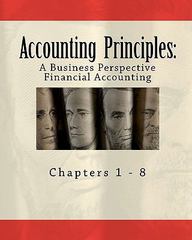Question
67. Which broker-dealer(s) was taken over on September 15 2008? a. None of the answers b. Goldman Sachs c. Morgan Stanley d. Merrill Lynch e.
67. Which broker-dealer(s) was taken over on September 15 2008?
a. None of the answers
b. Goldman Sachs
c. Morgan Stanley
d. Merrill Lynch
e. All of the answers
68. Which investment bank did JP Morgan take over in the spring of 2008?
a. None of the answers
b. Fannie Mae
c. Lehman
d. AIG
e. Bear Stearns
69. Which is a government sponsored entity(s) in the USA?
a. JP Morgan
b. None of the answers
c. FOMC
d. AIG
e. All the Answers
70. Which is a government sponsored entity(s) in the USA?
a. JP Morgan
b. AIG
c. None of the answers
d. Fannie Mae
e. All the Answers
71. Which of the following can hurt your credit rating?
a. making late payments on loans and debts
b. using your credit card frequently for purchases
c. living in the same location too long
d. staying in one job too long
72. Which of the following can hurt your credit rating/credit score?
a. Living in the same location too long
b. Making late payments on loans and debts
c. None of the answers
d. All of the answers
e. Moving from one job too another annually
73. Which of the following changes is likely to help reduce future inflation in the economy?
a. raising tariffs on the products we import
b. lower interest rates
c. higher interest rates
d. increasing the quantity of money in the economy
74. Which of the following helps to manage a credit card wisely?
a. have a number of different credit cards to share the debt
b. only pay the minimum balance required
c. check credit card statements every six months
d. pay credit card bills by a shown due date
75. Which of the following investments would likely involve the greatest amount of risk?
a. investing in an individual stock
b. investing in a pension fund
c. investing in a mutual fund
d. investing in a bond
76. Which of the following is not a type of tax paid by individual Canadians?
a. income tax
b. goods and services tax
c. capital gains tax
d. shareholder tax
77. Which of the following will help lower the total cost of a house?
a. making monthly payments rather than payments every two weeks
b. agreeing to pay the current rate of interest on the mortgage for as many years as possible
c. paying off the mortgage over a longer period of time
d. making a larger down payment at the time of purchase
78. Which of the following would be hurt by unexpected inflation?
a. Businesses with large debts
b. Businesses with wages determined by long term contracts
c. Businesses holding large amounts of financial assets with fixed interest rates (bonds)
d. Businesses with large inventories
79. Which were broker-dealers in the US in the spring of 2008?
a. Goldman Sachs
b. Lehman Brothers
c. Bear Stearns
d. All of the answers
e. None of the answers
80. Which were broker-dealers in the US prior to the crisis of 2008?
a. Morgan Stanley
b. Goldman Sachs
c. All of the answers
d. Merrill Lynch
e. None of the answers
81. Who is responsible for your financial situation?
a. All of the Answers
b. I am solely responsible for my future, no one else is coming to my rescue
c. My parents and family
d. The government
e. None of the Answers
82. Who owns the major banks?
a. the largest depositors
b. the shareholders
c. the federal government
d. the provincial governments
83. Who regulates the Chartered banks in Canada?
a. All the above
b. The Department of Finance
c. The Federal Reserve
d. None of the above
e. CMHC
84. Why did the Fed set up a swap line with European Central Bank (ECB)?
a. All of the Answers
b. The Fed was hoping the ECB would help with Lehman bank
c. None of the Answers
d. The Fed was trying to make sure that no US currency would leave the country
e. The Fed was making sure that foreign banks would be weaker than US banks
85. Why did the Fed undertake Large-Scale Asset Purchases(LSAP)?
a. None of the answers
b. All of the answers
c. Conventional monetary policy was exhausted
d. The federal funds rate near zero
86. Why did the Federal Reserve and Federal Treasury arrange for the takeover of Bear Stearns but not Lehman?
a. None of the Answers
b. Lehman had foreign owners that made it impossible to finance
c. Bear Stearns was a larger bank than Lehman
d. All of the Answers
e. Lehman did not have enough collateral
87. Why did the US housing market decline after 2006?
a. None of the answers
b. Lower mortgage rates have had a negative impact
c. All the answers
d. As house prices fell there was a large number of home owners who had negative equity in their homes leading to folks walking away from their homes
e. There was been a large increase in the number of mortgage payers who could not make their payments
88. With the deficit so high why was the government spending money on QE?
a. The Fed believed that their additional borrowing would help more than hurt the economy
b. The Fed had received permission to spend the TARP money and so used it to buy bad loans
c. None of the Answers
d. All of the Answers
e. The Fed used its increased powers to borrow from the banks
Step by Step Solution
There are 3 Steps involved in it
Step: 1

Get Instant Access to Expert-Tailored Solutions
See step-by-step solutions with expert insights and AI powered tools for academic success
Step: 2

Step: 3

Ace Your Homework with AI
Get the answers you need in no time with our AI-driven, step-by-step assistance
Get Started


